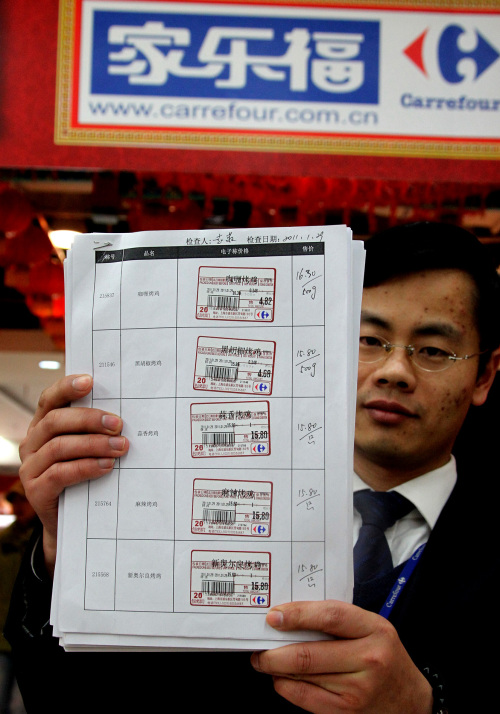SHANGHAI (AFP) ― China price regulators are seeking to fine French retail giant Carrefour 2.5 million yuan ($380,000) ― the maximum fine for overcharging customers, state media reported Sunday.
Municipal regulators fined three Carrefour stores in Shanghai and two in southwest China’s Yunnan province 500,000 yuan each on Saturday, the official Xinhua news agency reported.
However, the final fine will be decided only after a hearing where regulators said Carrefour representatives will be able to respond to the charges, the report said. It gave no further details about the hearing.
A total of 11 Carrefour stores were accused of charging more than the price they displayed on products ranging from cotton underwear and tea leaves to rubber gloves, according to reports.
Three Wal-Mart stores also face fines for overcharging.
 |
A Carrefour employee presents a re-examined price tag in a store in Shanghai on Sunday. (Xinhua-Yonhap News) |
Carrefour “sincerely apologizes” and has offered to refund customers five times the difference between the price charged and that on the label, state media reported last week, citing company officials.
“We will have our special control group conduct internal price inspections, with wide coverage and high frequency,” Carrefour China’s head of public relations Chen Bo was quoted as telling Xinhua.
Local authorities were ordered to fine the Carrefour and Wal-Mart stores for deceptive pricing practices and confiscate their “illegal income,” the National Development and Reform Commission said on its website Wednesday.
Fines should be five times the amount confiscated, or up to 500,000 yuan if the amount cannot be calculated, the statement said.
The commission, China’s top economic planner, also urged authorities to step up price investigations ahead of the Lunar New Year, which falls on Feb. 3, and punish serious offenders with fines and license suspensions.
Retail spending usually soars for the most important holiday of the year as people splash out on food and gifts for families and friends.
The crackdown comes as Beijing tries to curb inflation, which stood at 4.6 percent on year in December, down from a two-year high of 5.1 percent in November.
But analysts expect consumer prices to increase at a faster pace this month due to cold weather and the holiday season.








